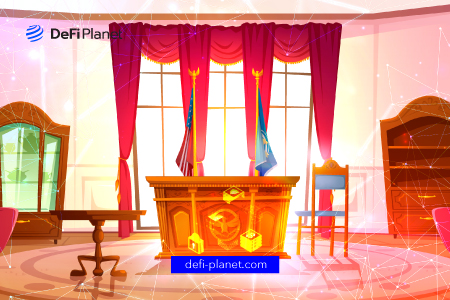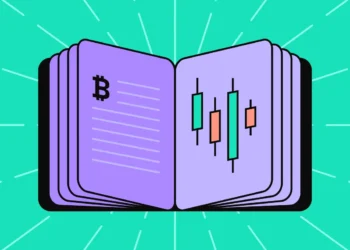Governance is an element of blockchain technology that has endeared it to several industries and businesses. The establishment of the
Decentralized Autonomous Organization (DAO) is an integral part of blockchain governance that has recently become relatively prevalent.
The principal-agent dilemma is a problem that affects practically every industry today. DAOs seek to address this issue by developing a trustless system that eliminates the need for such hierarchical systems. DAOs transfer the trust factor from a single agent to the smart contract code, which is transparent and can be verified by anyone in the organization.
Blockchain governance is more than just DAOs, as it has additional elements that will be discussed in this article. The definition of blockchain governance, the many types of blockchain governance, and their advantages and drawbacks will be discussed in this article.
What is Blockchain Governance?
The blockchain space is constantly evolving, but decentralization remains a fundamental component. Blockchain governance involves managing the various elements and requirements of emerging blockchain technology. It entails overseeing the different governance layers and components that make up a blockchain.
Although blockchain technology is inherently decentralized, some blockchain-related organizations are centralized.
Blockchain governance seeks to ensure that a platform operates efficiently, keeps up with industry developments, and serves its users’ needs. Centralized platforms are easier to manage than decentralized platforms, which may rely on smart contracts, native tokens, and other elements.
Blockchain governance is the equivalent of the conventional governance framework currently employed by traditional corporations, teams, and even governments.
In some cases, the conventional governance method is direct government; in others, it is representative governance.
Direct governance may resemble a Decentralized Autonomous Organization (DAO), although this type of governance has existed for a long time.
In this instance, everyone is permitted to engage in government and vote when decisions must be made. Traditionally, it may be difficult to implement this kind of governance because it is cumbersome, except in the case of a DAO, which employs smart contract technology.
The other type of standard governance system is representative governance, where community members are allowed to elect their representatives to make decisions for them. The only time the community is permitted to vote is when it is time to elect representatives or leaders.
What Are The Types Of Blockchain Governance?
A blockchain governance system comes in different forms: centralized and decentralized, as well as on-chain and off-chain governance systems. This section examines the types of blockchain governance mechanisms.
Centralized vs Decentralized Blockchain Governance
Centralized Blockchain Governance System
A centralized system is a governance mechanism in which one person or a few individuals decide what happens in the ecosystem. Typically, this system is used by many big blockchain-related organizations, such as Coinbase and Binance.
Centralized blockchain organizations are easier to govern than their decentralized counterparts because the authority is situated at a single point. Centralized blockchains are not considered as complex as their decentralized counterparts since only a select few determine what happens in the organization. They draft the plans and strategies, and others must adhere to them.
The major difference between a centralized and a decentralized governance system is the presence or absence of a centralized authority.
A centralized governance system may be effective if the authorities are knowledgeable since they would possess the necessary knowledge and information to make rational decisions.
Rapid decision-making is one advantage of centralized governance. In a fast-paced environment, quick decisions are necessary. This may not be possible in a decentralized organization because a voting session must be held, which may take days or weeks before a decision is made. A centralized authority can easily make decisions without sentiment rather than the entire community.
Decentralized Blockchain Governance System
The core element of blockchain is decentralization, as it eliminates the need for a centralized authority or an intermediary to oversee transactions. It is different from the traditional concept of governance in finance, where central authorities in the form of apex banks decide what happens in the economy.
Decentralization is a determinant of the nodes in blockchain technology. The number of nodes under individual control that maintain the network determines decentralization. The greater the number of nodes supporting the network, the more resistant it is to censorship.
In blockchain-related organizations, decentralization may occur in the decision-making process. Decentralized Autonomous Organizations are important in this regard. Decentralized Autonomous Organizations (DAOs) are organizations governed by community members who typically own the platform’s native tokens. A DAO is typically created with an overarching goal in mind. It could be intended to function as an investment group, with people pooling their resources to invest in the DeFi and NFT ecosystems.
Usually, decentralized blockchain governance works with the help of smart contracts. Here, the organization’s tenets are incorporated, ensuring that the organization is governed automatically.
Decentralized networks tend to have consensus mechanisms necessary for operating the ecosystem. Different blockchain consensus mechanisms exist, with each operating on a unique principle.
Common consensus mechanisms are Proof-of-Stake, Proof-of-Work, Delegated Proof-of-Stake, Proof-of-Capacity, and Proof-of-Activity.
A major advantage of this system is the absence of a single point of failure. Decentralization implies that no centralized authority decides what happens, reducing the risk of the single authority making wrong decisions or being attacked.
Decentralized organizations tend to be highly transparent since everyone must be aware of the happenings in the ecosystem. Accountability is also a common theme of a decentralized organization.
Typical DAOs have councils that carry out the decisions of the community. The community can decide to remove any individual that goes against the chosen option. This is advantageous in terms of providing a check and balance to those on the council.
Maximum transparency decreases the possibility of a centralized authority acting to undermine community principles, reducing the chances of a single point of failure.
On-chain and Off-chain Governance Systems
On-chain Governance System
In an on-chain blockchain governance system, any decision must be integrated into the platform’s codebase, which may be in its smart contract. Changes are made based on the rules that have been enshrined in the code of the platform.
A popular example of a blockchain that uses this method is Tezos. It has a purely on-chain governance system, where holders of the XTZ tokens are expected to delegate them to baking nodes. Out of the baking nodes, only five hundred have voting power, and five stages must be followed before a decision is made.
80% of the delegated voting power must be met before any change is made.
Any agreement made in this case is binding on the platform and can’t be altered. This type of governance system is usually transparent, as everyone knows the alternatives available before voting begins.
Another benefit of this system is that the voting session has a fixed period after which the consensus is chosen, making decisions faster.
On-chain governance may lead to low voter turnout because a single node with many native tokens can decide what happens on the platform. Typically, those crypto holders with an extensive portfolio can manipulate the voting to their advantage, making the entire process non-democratic.
Developers propose changes that can improve the platform via updating the previous code. The proposal can either be accepted or rejected based on the rules guiding the voting platform. Once the proposal is submitted, every participant is allowed to vote based on the number of tokens they hold. Some platforms dictate that the alternative or proposition with the highest votes is chosen. At the same time, some may demand that a certain percentage of voters assent to a decision before it is made.
Off-chain Governance Systems
This type of governance system integrates both formal and informal aspects, such as discussions in online and offline events about proposed changes. Off-chain governance is common in many blockchains, as proposed changes are tabled for approval by all major stakeholders.
Off-chain is not rule-based like its counterpart, reducing the risk of a select few people, who may be developers, deciding what happens on the platform.
Unlike in the on-chain governance system, different stakeholders come together trying to reach a consensus without any code present to bind their behaviour in a certain way.
Here, developers also submit proposals to the community, and different participants discuss the proposals via private and public methods. Everyone airs their opinions concerning the proposal.
If the community does not reach a consensual decision, it could lead to a hard fork, where a new blockchain is created. Decision-making in this type of governance system may be slower than in others.
In Conclusion,
- Blockchain governance involves managing the various elements and requirements of evolving blockchain technology.
- A centralized system is a governance structure in which one or a few people decide what happens in the ecosystem.
- Smart contracts are used to facilitate decentralized blockchain governance.
- Any decision made in an on-chain blockchain governance system must be integrated into the platform’s codebase, which may be in its smart contract.
- Unlike its counterpart, off-chain is not rule-based, decreasing the possibility of a select few people, who may be developers, dictating what happens on the platform.
If you would like to read more articles like this, visit DeFi Planet and follow us on Twitter, LinkedIn, Facebook, and Instagram.
“Take control of your crypto portfolio with MARKETS PRO, DeFi Planet’s suite of analytics tools”






















